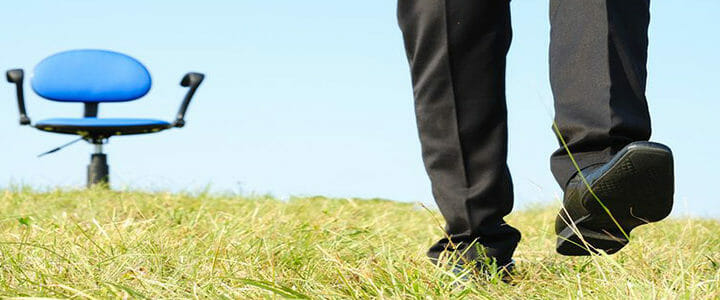Yoga is about mindfulness. As one who has both practiced and taught yoga for more than a decade -I can affirm that aspects of daily life can jive better with a regular yoga practice. But yoga doesn’t only enhance your life skills – it can also enhance you work skillset. If your work involves channeling your intellectual efforts to achieve positive outcomes, then consider applying these elements of a yoga practice the next time you’re dealing with a challenge – no yoga mat required.
Flexibility
In a yoga practice, flexibility is about regular movements, both muscle and mental, that take you further than you expected on a given day.
Apply it at Work: Flexibility is the mindset that allows you to bend. To shift work priorities on a dime, respond to emergent customer needs, or consider perspectives that diverge or compete with your own. And show me a supervisor, teammate, or subordinate who doesn’t appreciate the flexibility of a colleague who can provide much-needed support in times of crises.
Truthfulness
Yoga involves introspection, and the minutes you spend quietly moving and breathing is where you can reach a lot of truths. Some are simple, while others are complex. Some are intentional realizations, while others take you by surprise.
Apply it at Work: It’s easy to get distracted by the spinoff of a problem’s fascinating appendages. Yoga facilitates the mental discipline and fortitude to ask the right questions. What parts of this issue are relevant? How do we regain our customers’ trust? Which solutions offer lasting outcomes? The ability to reveal key insights can help focus your efforts – and maybe bring along others with you.
Let Go
Yoga is about letting go of what gets in your way of discovering what’s next. “Let go” is a common mantra (or phrase) used to encourage you to clear your mind of clutter, negative experiences, or bad ideas that prevent you from moving on to the next important thing.
Apply it at Work: Reflecting on our setbacks to do things better next time is smart. Dwelling is not. Take what you can learn from the experience and carry the knowledge forward. And yes, you were probably right in that disagreement with a colleague yesterday, but some perspectives or behaviors you’ll never change. Letting go of the chaff will free up intellectual space for issues that truly matter – and the ones you can influence.
Accept the Adjustments
In yoga class, the teacher often cruises around the room, offering suggestions on how to adjust a pose for better alignment. You think you’re doing just fine, but you make the adjustment so she’ll move out of your space and alight on her next victim. But then you discover that you’re in fact more stable in the pose with that slight shift of your knee or the straightening of your spine. Huh.
Apply it at Work: In theory, we want to hear it all – what we do well and in what areas we can improve. But often the way we receive feedback says otherwise. When you’re invested in a plan and ready to move out, suggestions may not be convenient or welcome. Letting go of your attachment, if only temporarily to evaluate the suggestion, might lead to an adjustment that enhances your plan in ways you’d not have realized on your own.
Sacrifice the Ego
It’s nearly impossible to practice yoga without acquiring a little humility. Appreciating where you can take a pose today, and ignoring what that uber-bendy millennial is doing one mat over, will ensure you gain the right benefits from your yoga practice.
Apply it at Work: Here’s a thought about competition: Competing against others can quickly divide a team. Measuring performance against your abilities, mission demands, previous benchmarks, or performance goals you establish with your mentor or team is usually a more relevant indicator of your own success.
Breathe
Yoga combines movement and breath. Breathing is what makes yoga different from other “fitness” classes. You hold your pose not for seconds or number of reps, but by the number of breaths. The intake of oxygen into the lungs, heart, brain and bloodstream create a fresh infusion that helps calm the mind and encourage perspective.
Apply it at Work: There’s a reason why people often suggest to a stressed-out person they take a deep breath. Crises, roadblocks, and frustrations are just more manageable with a pause and intake of air. Take a few. The perspective gained in just a few deliberate breaths can reset what could have been a powder keg situation to one that seems manageable – if not immediately solvable. Breathing may not fix the problem, but it enhances your ability to constructively approach it and find solutions.
Back to Center
At the end of challenging yoga sequences, the yoga teacher often brings you back to center. This position is, without religious attribution, a joining of the palms together at the center of your chest, or heart center, and gives you pause to reflect on the previous pose, what’s coming next, or maybe why you’re practicing yoga in general.
Apply it at Work: Regardless of the failures you experienced today, acknowledge your effort and glean what you can from those preceding moments. Then remember why you do this work – to serve an important customer or mission…to take care of the people important to you…to fund your next vacation…or to simply keep your mind engaged and sharp. Whatever it is, bring your focus back to why you do the work. Those core reasons are your center. And bring it with you when you return to the office tomorrow. Namaste!


